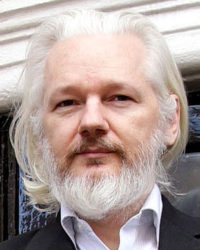UNITED NATIONS (Reuters) – Ecuador hopes that the October questioning of Wikileaks founder Julian Assange, holed up in the country’s London Embassy since 2012, will mark the “beginning of the end” of the legal deadlock over case, Ecuador’s foreign minister said.
Wikileaks burst onto the world scene in 2010 when it collaborated with media organizations to release US State Department diplomatic cables. The leak opened a global debate over the proper limits of journalism and state transparency.
A Swedish appeals court last week upheld an arrest warrant for Assange, clearing the way for him to be questioned in Ecuador’s London embassy on October 17.

“We hope that the interview in October can put an end to what is a pretty bad situation for Mr Assange,” Foreign Minister Guillaume Long told Reuters on the sidelines of the United Nations General Assembly.
“We hope that it is the beginning of the end of Julian Assange’s plight. He’s welcome to stay with us but we know that is not the solution to the problem.”
Assange, 45, is wanted in Sweden for questioning over allegations, which he denies, that he committed rape in 2010.
He avoided possible extradition to Sweden by taking refuge in Ecuador’s London embassy. He says he fears further extradition to the United States, where a criminal investigation into the activities of Wikileaks is ongoing.
“The fear about political persecution stems from the fact that we never received guarantees that there was not going to be an extradition to a third country,” Long said.
“The threat of political persecution is still there and the grounds for granting Mr Assange his asylum still exist. We have no intention of taking away that asylum as it stands,” he added.
The status quo is hardly satisfactory, from the standpoint of Assange’s health, Long said.
“I’ve been to visit him on several occasions and I see a deterioration,” he said.
“He does not have much access to light. He has no access whatsoever to exterior space. There is no internal patio. There is no fresh air,” Long said.
The minister would not say how much it was costing Ecuador to keep Assange.
“I don’t have the exact figure, but it’s certainly costing Ecuador much less that it’s costing the British authorities to have the Ecuadorean embassy under a state of siege for four years,” Long said.
Assange is unable to leave the embassy without being arrested by British police for breaching his bail conditions.
In July Wikileaks released files of what it said were audio recordings pulled from the emails of the Democratic National Committee that were obtained by hacking its servers. The leak rattled the Democratic National Convention where Hillary Clinton was named the party’s presidential nominee, and prompted party chairwoman Debbie Wasserman Schultz to step down.
Asked what Assange does with his time, Long said, “You’d have to ask him. But he seems to be very busy.”




